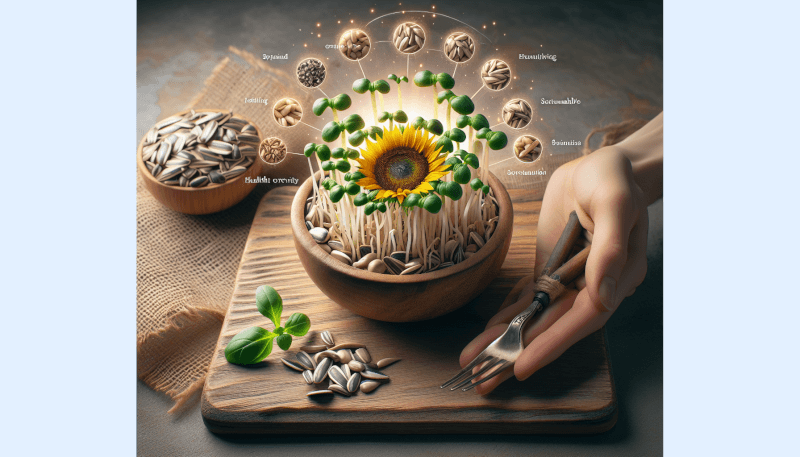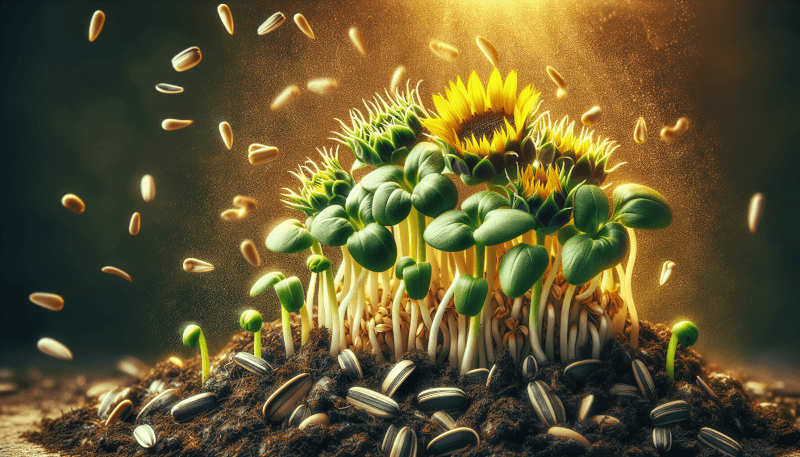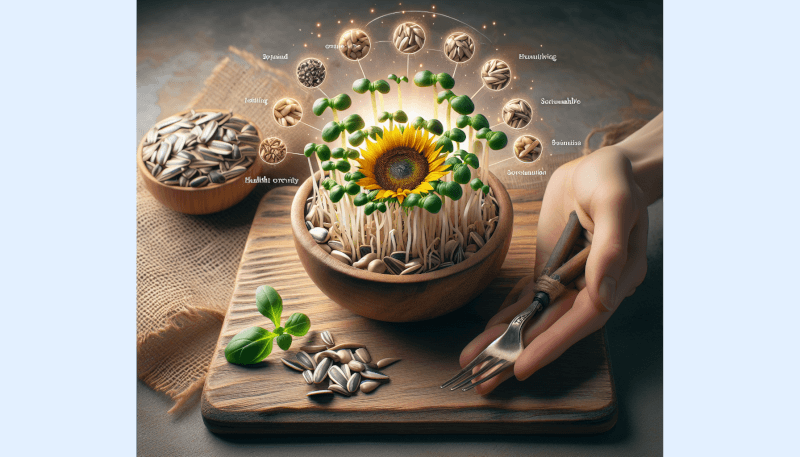Imagine biting into a burst of freshness and crunchiness, all while indulging in the delectable flavors of organic sunflower sprouting seeds. Grown with care and free from harmful chemicals, these seeds are packed with nutrients that will nourish your body from the inside out. Whether you sprinkle them on top of your salads, mix them into your granola, or simply enjoy them as a refreshing snack, these organic sunflower sprouting seeds are a delicious and wholesome addition to your culinary repertoire. Taste the goodness of nature and experience a burst of vitality with every bite.

About Organic Sunflower Sprouting Seeds
Organic sunflower sprouting seeds are a versatile and nutritious addition to any healthy diet. These seeds, when sprouted, develop into delicate and flavorful sprouts that can be used in a variety of culinary preparations. Whether you’re looking to enhance the taste and texture of your salads, sandwiches, smoothies, or stir-fries, organic sunflower sprouting seeds can bring a burst of freshness and vitality to your meals.
Benefits of Organic Sunflower Sprouting Seeds
Organic sunflower sprouting seeds offer numerous health benefits that make them an excellent choice for anyone seeking to improve their overall well-being. These sprouts are packed with essential vitamins and minerals, including vitamin E, magnesium, iron, and folate. They are also a great source of antioxidants, which help protect the body against free radicals and reduce the risk of chronic diseases.
Furthermore, organic sunflower sprouting seeds are incredibly low in calories and high in fiber, making them an ideal addition to a weight-loss or weight-management plan. They can also contribute to improved digestion and gut health, thanks to their high fiber content.
How to Sprout Organic Sunflower Seeds
Sprouting organic sunflower seeds at home is a simple and rewarding process that anyone can do. By following a few easy steps, you can enjoy the freshness and nutrition of homegrown sprouts in a matter of days.
Choosing and Storing Organic Sunflower Sprouting Seeds
To ensure the best results, it is crucial to choose high-quality organic sunflower sprouting seeds. Look for seeds that are specifically labeled for sprouting purposes and have been certified organic. This ensures that the seeds are free from pesticides and other harmful chemicals.
Once you’ve chosen your seeds, proper storage is key to maintaining their freshness and viability. Store them in an airtight container in a cool and dark place, such as a pantry or refrigerator. This will help extend their shelf life and preserve their sprouting potential.

Preparing Organic Sunflower Sprouting Seeds for Sprouting
Before starting the sprouting process, it is essential to rinse and clean the organic sunflower sprouting seeds. This step helps remove any debris or impurities that may be present on the seeds.
After cleaning, soaking the seeds is the next step in preparing them for sprouting. Soaking softens the outer shell of the seeds and promotes germination. Place the seeds in a bowl of water and let them soak for about 8-12 hours, or overnight.
Once the soaking period is complete, rinse and drain the organic sunflower sprouting seeds thoroughly to remove any excess water and promote proper sprouting.
Sprouting Organic Sunflower Seeds
There are a few different methods you can use to sprout organic sunflower seeds, depending on your preference and available resources.
The basic sprouting method involves using a glass jar, a breathable cover such as cheesecloth or a mesh sprouting lid, and clean water. Simply place the soaked and drained seeds in the jar, cover with the breathable material, and secure it in place with a rubber band. Rinse and drain the seeds twice a day, ensuring they remain moist but not soggy. Within a few days, you will start to see small sprouts emerging.
If you prefer a more organized and controlled approach, using a sprouting tray may be the way to go. Sprouting trays provide a convenient way to sprout multiple batches of seeds at once, with separated compartments to prevent cross-contamination. Follow the instructions provided with your sprouting tray for the best results.
For those looking to take their sprouting adventures a step further, growing organic sunflower sprouts into microgreens is a fantastic option. Microgreens are the young seedlings of various plants, including sunflowers, and they boast an even more concentrated flavor and nutrient profile. To grow microgreens, use a shallow tray filled with a nutrient-rich growing medium, such as soil or coconut coir. Spread the soaked and drained seeds evenly across the tray, sprinkle a thin layer of soil over them, and mist them with water. Place the tray in a well-lit area and mist the seeds daily to keep them moist. In about 1-2 weeks, you’ll have vibrant and tasty microgreens ready for harvest.
Caring for Organic Sunflower Sprouts
Proper care is essential to ensure the healthy growth and development of your organic sunflower sprouts.
Watering the sprouts is a critical aspect of care. They require regular watering to maintain optimal moisture levels. Use a gentle spray or misting bottle to water them, avoiding excessive force that could damage the delicate sprouts. Aim to keep the sprouts slightly moist but not waterlogged.
Providing adequate light is also crucial for the healthy development of your organic sunflower sprouts. Place them near a window or under a grow light, ensuring they receive about 6-8 hours of indirect sunlight per day. This will promote photosynthesis and help the sprouts grow tall and vibrant.
While caring for your sprouts, it’s important to be mindful of potential mold growth and pest issues. To avoid mold, ensure proper ventilation and avoid overcrowding the sprouts. If you notice any signs of mold, remove the affected sprouts immediately and adjust the growing conditions as needed. Pest issues are rare, but if you encounter any pests, such as fruit flies or fungus gnats, you can use organic pest control methods such as neem oil spray or sticky traps.
When and How to Harvest Organic Sunflower Sprouts
Knowing when to harvest your organic sunflower sprouts is crucial to ensure maximum flavor and nutrition. It typically takes around 7-10 days for the sprouts to reach their peak freshness and taste.
You can determine the right time to harvest by observing the growth of the sprouts. Once they have developed a second set of leaves and reached a desired height of about 4-6 inches, they are ready for harvest. Using clean scissors or a sharp knife, carefully cut the sprouts just above the base, leaving a small stem attached.
Using Organic Sunflower Sprouts in Culinary Delights
Organic sunflower sprouts can add a delightful crunch and a burst of flavor to a wide range of culinary creations. Here are a few delicious ways to incorporate them into your meals:
Adding Organic Sunflower Sprouts to Salads and Sandwiches: Top your favorite salads or sandwiches with a generous handful of organic sunflower sprouts. Their mild and nutty taste pairs well with a variety of ingredients, enhancing both the texture and flavor of your dish.
Incorporating Organic Sunflower Sprouts into Smoothies and Juices: Blend a handful of organic sunflower sprouts into your favorite smoothie or juice recipes. They add a fresh and vibrant element to your beverage, while also infusing it with essential nutrients.
Using Organic Sunflower Sprouts in Stir-Fries and Soups: Toss organic sunflower sprouts into stir-fries or add them to soups during the last few minutes of cooking. Their slight crunch and delicate flavor will complement the other ingredients beautifully.
Nutritional Value of Organic Sunflower Sprouts
Organic sunflower sprouts are a nutritional powerhouse, offering an array of vitamins, minerals, and health-promoting compounds.
These sprouts are an excellent source of vitamin E, which is a powerful antioxidant that protects cells from damage caused by free radicals. They also contain significant amounts of magnesium, iron, and folate, all of which are essential for various bodily functions.
In addition to vitamins and minerals, organic sunflower sprouts are rich in fiber, which aids in digestion and helps keep you feeling full and satisfied. They are also low in calories, making them a perfect addition to a balanced diet.
Where to Buy Organic Sunflower Sprouting Seeds
If you’re ready to embark on your organic sunflower sprouting seed journey, you may be wondering where to find these seeds. Here are two excellent options:
Local Health Food Stores: Many health food stores carry a variety of organic sprouting seeds, including sunflower seeds. Visit your nearest health food store and inquire about their selection. The staff will be happy to assist you in finding the right seeds for sprouting.
Online Retailers for Organic Sunflower Sprouting Seeds: Numerous online retailers specialize in organic sprouting seeds and offer a wide variety of options. By browsing through their websites, you can easily find and order organic sunflower sprouting seeds from the comfort of your own home.
Conclusion
Organic sunflower sprouts are a delicious and nutritious addition to any culinary repertoire. By selecting high-quality seeds, following proper sprouting techniques, and caring for your sprouts, you can enjoy the fresh and vibrant taste of homegrown sprouts. Whether you choose to incorporate them into salads, sandwiches, smoothies, or stir-fries, organic sunflower sprouts will bring a burst of flavor and nutritional benefits to your meals. So why not give them a try? Start sprouting your organic sunflower seeds today and embark on a journey of healthy and delectable eating.




